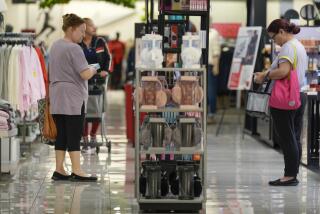Monthly Retail Sales Fall, but Results Don’t Worry Analysts
- Share via
U.S. retail sales plunged in February as consumers took a breather after spending big in January, while the current account deficit ballooned to a record in the fourth quarter, the government said Tuesday.
Retail sales fell a larger-than-expected 1.3% last month, the first decline since August and sharper than the 0.8% decline forecast by Wall Street.
But the Commerce Department upwardly revised January sales to a 2.9% increase, the largest rise in more than four years, from 2.3% originally reported, and analysts shrugged off February’s weakness as an inevitable pullback after warm weather boosted shopping in January.
“If you put the two months together it still looks as if retail sales were strong at the beginning of the year -- an average increase of 0.8% for each of the two months,” said Gary Thayer, chief economist at A.G. Edwards & Sons in St. Louis.
A separate report showed that the U.S. current account deficit, the broadest measure of U.S. trade with the world, widened in the fourth quarter to $224.9 billion as imports of goods jumped and net unilateral current transfers rose sharply.
The quarterly shortfall in the current account was much larger than Wall Street forecasts for a gap of $217.7 billion and pushed the 2005 deficit to a record $804.9 billion, or 6.4% of gross domestic product, from 5.7% of GDP in 2004.
Although some analysts have said the ballooning current account deficit simply reflects the fact that the U.S. spends more, saves less and has higher economic growth than the rest of the world, others argue that it leaves the country vulnerable to the changing appetite of foreign investors.
“The bottom line is that a current account deficit of this unparalleled magnitude is unsustainable and there is no hope of it being resolved painlessly through higher exports alone,” said Paul Ashworth, senior international economist at Capital Economics. “Instead it will require a big dollar depreciation alongside much weaker domestic demand for imports.”
Economists said the yawning trade gap could also put more pressure on Congress to curb imports from China, whose trade surplus with the U.S. has become a political hot potato for the White House. Critics say China’s refusal to allow its yuan currency to float freely gives it an unfair trade advantage because it cheapens Chinese exports.
The retail sales report indicated demand outside the auto sector was down 0.4% in February, in line with analyst expectations, in the largest decline since April 2004. Sales of motor vehicles and parts dropped 4.6% last month, the biggest drop since August 2005, after a 4.2% surge in January.
Sales of furniture, clothing, electronics and appliances all fell, the Commerce Department said. Gasoline station sales fell 1.6% as gas prices eased.
A separate report indicated mixed results at chain stores last week. Redbook Research, an independent company, said sales at major retailers were up 2.7% last week from a year earlier. But sales so far in March were down 2.4% compared with the same period in February, Redbook said.
More to Read
Inside the business of entertainment
The Wide Shot brings you news, analysis and insights on everything from streaming wars to production — and what it all means for the future.
You may occasionally receive promotional content from the Los Angeles Times.










